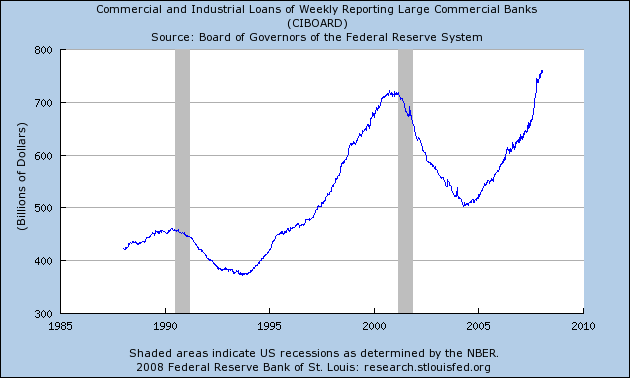Month: February 2008
What to do about climate change?
A new Cato study, by Indur Goklany, suggests that instead of carbon taxes we should spend money on better water policy, drought prevention, anti-malarials, sea level protection, and so on. In general we should make the world as wealthy as possible. Here is the link, the piece is intelligent throughout and well worth reading.
Two questions suggest themselves. First, is the choice either/or? I don’t see arguments against a revenue-neutral carbon tax. Second, is there really enthusiasm for the proposed measures or is the real intent to do little or nothing on carbon? Since this is both a Goklany piece and a Cato piece, an interesting question arises: who exactly is now obliged to push for anti-malarial foreign aid? Cato? Goklany? Either/or? Both? Or is it enough to just make the comparison once and leave it at that?
Mature CEO looks are correlated with company performance
When it comes to big business, appearances it seems, matter a lot.
Companies tend to be more profitable if they have a chief executive
with a face rated by observers as being more competent, dominant and
mature.Similarly, companies with a chief executive judged to be
a good leader, based purely on his facial appearance, also tend to be
more profitable. These associations still hold even after controlling
for the influence of age and attractiveness.As Nicholas Rule
and Nalini Ambady, who conducted the research, point out: it isn’t at
all clear whether chief executives with a certain kind of appearance
help their company towards profit, or if instead profitable companies
choose to employ chief executives who look a certain way.
Here is more information.
How Clinton, Obama, and McCain have voted on free trade issues
Edge: John McCain, as scored by Ben Muse. Ben has now moved all of his trade posts to a new blog, The Custom-House, recommended. And here’s Virginia Postrel, with some negative comments on McCain.
Department of Yikes
In a frightening inversion of satire into reality, European candlemakers are petitioning for protection; here is Bastiat’s take on that. This time it’s against — can you guess? — the Chinese.
Thanks to Tim Worstall for the pointer.
Do we undervalue routine?
The always-interesting Gretchen Rubin offers up this one-minute movie. I take the point to be that we under-appreciate the routine time we spend with our family and friends. Cherishing this time would give us better lives, it would seem. But why is this time so hard to cherish properly? Don’t we want better lives? Are we passing up a free lunch?
In the movie the little girl says that she loved that time with her mother, namely doing the routines of taking the bus. The routines are an investment in later good memories.
Are our memories determined by the value of the average bus trip, or by the value of the marginal bus trip? (Of course to some extent it is a weighted average of both.) I suspect the fun of the marginal trip weighs fairly heavily in our backward-looking assessment of our routines. Most of the bus trips don’t get noticed or perhaps they are even a drag. But whenever the pressures of the day occasionally slacked off, and the mother had more time with her daughter, that time seemed so wonderful.
So if you want good memories, should you make sure you don’t spend too much time with your kids? If I ate chicken in mole sauce every day my memories of it wouldn’t be so special. (Perhaps we measure peaks rather than computing the area under the integral?) But now the making and tasting of the mole stands as an occasion to remember. High total value equals low marginal value and perhaps poor memories. Low total value equals high marginal value and better memories. Of course if your total time with your kids is truly low, they will hate you and your marginal time with your kids will be crummy as well.
Words of wisdom
This is from Bryan Caplan:
Fun facts from Kip Viscusi‘s article on "Job Safety" in David Henderson’s encyclopedia:
Annual OSHA penalties for safety violations (2002): $149,000,000
Annual Workers Compensation Premiums (2001): $26,000,000,000
Estimated Annual Wage Premiums for Risky Activities (2004 dollars): $245,000,000,000
His point: Market incentives for worker safety dwarf legal incentives, which in turn dwarf regulatory incentives. The level of safety we see in the workplace today is about the same as the level we’d see if government just looked the other way.
Addendum: This picture shows how much OSHA has increased American job safety.
What makes an entrepreneur?
A Brazilian entrepreneur, that is. First and foremost, entrepreneurship is predicted by family characteristics, most of all having other entrepreneurs in the family and coming from a large family. What predicts finding a successful entrepreneur?: "the individual’s smartness and higher education in the family." Entrepreneurs are not more self-confident than non-entrepreneurs and overconfidence is a big danger. Social networks predict who becomes an entrepreneur but not who becomes a successful entrepreneur. Entrepreneurs in Brazil exhibit more trust but this result does not seem to generalize across countries.
Here is the paper, from the World Bank. I thank Russ Roberts for the pointer.
Tim Harford on CEO pay, book forum continues
Most likely we’ll get our next installment of the book forum tomorrow morning; there is some chance it will pop up today.
If you’re not looking at the betting markets…
You should be. Right here. C’mon people, turn your TVs off and go crash the InTrade servers, making sure you pay homage to Hayek and Robin Hanson along the way.
Can Larry Summers talk me into the stimulus package?
Here is his non-excerptable attempt, via Brad DeLong. Still I am not convinced. Using the Law of the Excluded Middle, yes you can get me to agree that the stimulus package is unlikely to do direct economic harm. I still see the stimulus plan in terms of larger symbolic battles. We pass too many policies just to show politicians are "doing something," just because it is an election year, just because voters think government should solve every problem, and just because politicians know that voters don’t understand any real economics. This fits all those categories. On the substance, I would add that for the U.S. "not going bankrupt" is a matter of degree. Compared to Brad or Arnold Kling, I’m still a fiscal optimist. But I’ve spent too much time reading papers on the intransitivity of indifference relations: "Just another grain of sugar in your coffee, dear. It won’t change the taste even a tiny bit…"
Hansonian Normality
Yesterday my friend Robin Hanson walked into my office and said "Heh, how about that football game!" My world was momentarily jarred. This may be the most normal thing Robin has ever said to me.
Fortunately, things are back to normal today. Robin is speaking at a conference on the Search for Extra Terrestrial Life. Gotta love GMU.
What Credit Crunch?
Paul Krugman points to the new Federal Reserve senior loan officer survey which reports that standards for commercial real estate loans are tightening creating in Krugman’s words "an incredible credit crunch in progress."
Over at Carpe Diem, however, Mark Perry looks to Federal Reserve data on actual loans and finds that commercial loans from large banks are at an all time high and increasing rapidly.
The credit crunch, if that is what one should call higher standards, appears to be contained to the real estate market.
Does the quality of blog comments deteriorate?
Forget about MR and its superb commentators, I am talking about the typical above-average blogs. I often have the impression that the best comments come in the first fifteen or so, after which quality declines precipitously and often exponentially. Why might that be?
1. The truly smart people only like to make smart points on "fresh" posts. For instance more people read the comments on fresh posts (but why?), so the
benefit of a quality comment is lower as the post becomes older.
2. As time passes, the chance that a warring twosome find each other, and take over the thread, increases.
3. There is a tendency to attack or respond to the stupidest or most controversial thing said, and the longer the comments thread runs for, the stupider this will get.
4. As the number of comments multiplies, so does the number of independent discussion threads and the optimal number of threads is exceeded.
5. (Addended) As one (early) commentator notes below, the simple fact of diminishing marginal utility.
Might some of these mechanisms also help explain why a) history of thought is "ghettoized" as a field, and b) there is such a high premium to working in hot, new fields? The general point is that there are increasing returns to scale for high quality discussions; furthermore those quality discussions are quite fragile and require cultivation and subsidization through norms. Freshness matters, so stale topics will indeed encounter discrimination.
Comments are open, who wants to go first?
Bill Traylor

Assorted links
1. New blog on Canadian economics
2. New blog on the bond market
3. Markets in everything: how much should you charge for a job interview?, via MV.
